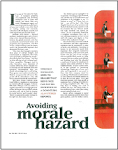 It has been reported that almost half of Australia’s privately owned companies are starting to struggle and as a result have implemented wage freezes and cancelled investment or expansion plans in preparation for the tough year ahead. Private companies in Australia represent the bulk of small and medium businesses and account for almost half of Australia’s economic output. KPMGs annual survey of privately-owned firms revealed that more than half of all the firms had laid off staff in the previous 6 months and a further one-quarter intended to cut their head count over the next 6-12 months and of these half expected to cut staff by 5-10 percent. However in a survey produced by AMP Capital in 2008 revealed that about 30 percent of firms’ struggled to find appropriate skilled labour. Thus even in the worst of times, the need for skilled labour still remains. For a third year in a row, a skills shortage was reported across all industries. It remains high in mining, manufacturing and utility sectors, showing the traditional trade skills are still in short supply.
It has been reported that almost half of Australia’s privately owned companies are starting to struggle and as a result have implemented wage freezes and cancelled investment or expansion plans in preparation for the tough year ahead. Private companies in Australia represent the bulk of small and medium businesses and account for almost half of Australia’s economic output. KPMGs annual survey of privately-owned firms revealed that more than half of all the firms had laid off staff in the previous 6 months and a further one-quarter intended to cut their head count over the next 6-12 months and of these half expected to cut staff by 5-10 percent. However in a survey produced by AMP Capital in 2008 revealed that about 30 percent of firms’ struggled to find appropriate skilled labour. Thus even in the worst of times, the need for skilled labour still remains. For a third year in a row, a skills shortage was reported across all industries. It remains high in mining, manufacturing and utility sectors, showing the traditional trade skills are still in short supply.If you are looking at increasing your skills, SkillsTech Australia is the lead TAFE institute for training in automotive, building and construction, manufacturing and engineering, electrical/electronics and sustainable technologies throughout Queensland.
Enrolments for July 2009 are now available to visit their website for more details CLICK HERE.
Enrolments for July 2009 are now available to visit their website for more details CLICK HERE.






.png)







2 comments:
When you use the phrase "labor shortage" or "skills shortage" you're speaking in a sentence fragment. What you actually have to say is: "There is a labor shortage at the salary level I'm willing to pay." That statement is the correct phrase; the complete sentence, the intellectually honest statement.
If you start raising your wages and improving working conditions, and continue to do so, eventually you'll have people lining up around the block to work for you even if you need to have huge piles of steaming manure hand-scooped on a blazing summer afternoon.
Re: Shortage due to retirees: With the majority of retirement accounts down about 50% or more, people entering retirement age are being forced to work well into their sunset years. So, you won’t be getting a worker shortage anytime soon due to retirees exiting the workforce.
Okay, fine. Some specialized jobs require training and/or certification, again, raise your wages and improve benefits! You’ll incentivize people to self-fund their education so that they can enter the industry in a work-ready state. The attractive wages, working conditions and career prospects of technology during the 1980’s and 1990’s was a prime example of people’s willingness to fund their own education.
Thanks Suzie G for your comments, you have raised some good points. We’d be interested in exploring this issue in more depth. Perhaps there is someone out there with a different view point? It’s a complex issue and we have to say that as a business based in Queensland, Australia, we have seen organisations increasing salary and reward packages significantly in order to attract skilled employees. If you have an opinion or more information on this subject you wish to share we encourage you to post it! We’d be particularly interested in hearing from anyone working in organisations were skills shortages have been an issue or if you work in education and training policy.
Post a Comment